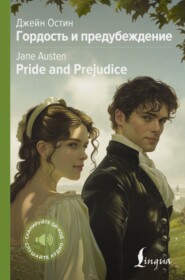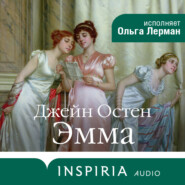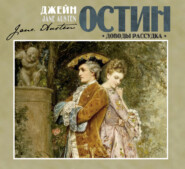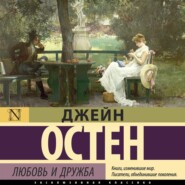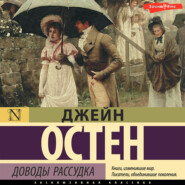По всем вопросам обращайтесь на: info@litportal.ru
(©) 2003-2025.
✖
Northanger Abbey / Нортенгерское аббатство
Настройки чтения
Размер шрифта
Высота строк
Поля
“I will drive you up Lansdown Hill tomorrow.”
“Thank you; but will not your horse want rest?”
“Rest! He has only come three and twenty miles today; all nonsense; nothing ruins horses so much as rest; nothing knocks them up so soon. No, no; I shall exercise mine at the average of four hours every day while I am here.”
“Shall you indeed!” said Catherine very seriously. “That will be forty miles a day.”
“Forty! Aye, fifty, for what I care. Well, I will drive you up Lansdown tomorrow; mind, I am engaged.”
“How delightful that will be!” cried Isabella, turning round. “My dearest Catherine, I quite envy you; but I am afraid, brother, you will not have room for a third.”
“A third indeed! No, no; I did not come to Bath to drive my sisters about; that would be a good joke, faith! Morland must take care of you.”
This brought on a dialogue of civilities between the other two; but Catherine heard neither the particulars nor the result. Her companion’s discourse now sunk from its hitherto animated pitch to nothing more than a short decisive sentence of praise or condemnation on the face of every woman they met; and Catherine, after listening and agreeing as long as she could, with all the civility and deference of the youthful female mind, fearful of hazarding an opinion of its own in opposition to that of a self-assured man, especially where the beauty of her own sex is concerned, ventured at length to vary the subject by a question which had been long uppermost in her thoughts; it was, “Have you ever read Udolpho, Mr. Thorpe?”
“Udolpho! Oh, Lord! Not I; I never read novels; I have something else to do.”
Catherine, humbled and ashamed, was going to apologize for her question, but he prevented her by saying, “Novels are all so full of nonsense and stuff; there has not been a tolerably decent one come out since Tom Jones, except The Monk; I read that t’other day; but as for all the others, they are the stupidest things in creation.”
“I think you must like Udolpho, if you were to read it; it is so very interesting.”
“Not I, faith! No, if I read any, it shall be Mrs. Radcliffe’s; her novels are amusing enough; they are worth reading; some fun and nature in them.”
“Udolpho was written by Mrs. Radcliffe,” said Catherine, with some hesitation, from the fear of mortifying him.
“No sure; was it? Aye, I remember, so it was; I was thinking of that other stupid book, written by that woman they make such a fuss about, she who married the French emigrant.”
“I suppose you mean Camilla?”
“Yes, that’s the book; such unnatural stuff! An old man playing at see-saw, I took up the first volume once and looked it over, but I soon found it would not do; indeed I guessed what sort of stuff it must be before I saw it: as soon as I heard she had married an emigrant, I was sure I should never be able to get through it.”
“I have never read it.”
“You had no loss, I assure you; it is the horridest nonsense you can imagine; there is nothing in the world in it but an old man’s playing at see-saw and learning Latin; upon my soul there is not.”
This critique, the justness of which was unfortunately lost on poor Catherine, brought them to the door of Mrs. Thorpe’s lodgings, and the feelings of the discerning and unprejudiced reader of Camilla gave way to the feelings of the dutiful and affectionate son, as they met Mrs. Thorpe, who had descried them from above, in the passage. “Ah, Mother! How do you do?” said he, giving her a hearty shake of the hand. “Where did you get that quiz of a hat? It makes you look like an old witch. Here is Morland and I come to stay a few days with you, so you must look out for a couple of good beds somewhere near.” And this address seemed to satisfy all the fondest wishes of the mother’s heart, for she received him with the most delighted and exulting affection. On his two younger sisters he then bestowed an equal portion of his fraternal tenderness, for he asked each of them how they did, and observed that they both looked very ugly.
These manners did not please Catherine; but he was James’s friend and Isabella’s brother; and her judgment was further bought off by Isabella’s assuring her, when they withdrew to see the new hat, that John thought her the most charming girl in the world, and by John’s engaging her before they parted to dance with him that evening. Had she been older or vainer, such attacks might have done little; but, where youth and diffidence are united, it requires uncommon steadiness of reason to resist the attraction of being called the most charming girl in the world, and of being so very early engaged as a partner; and the consequence was that, when the two Morlands, after sitting an hour with the Thorpes, set off to walk together to Mr. Allen’s, and James, as the door was closed on them, said, “Well, Catherine, how do you like my friend Thorpe?” instead of answering, as she probably would have done, had there been no friendship and no flattery in the case, “I do not like him at all,” she directly replied, “I like him very much; he seems very agreeable.”
“He is as good-natured a fellow as ever lived; a little of a rattle; but that will recommend him to your sex, I believe: and how do you like the rest of the family?”
“Very, very much indeed: Isabella particularly.”
“I am very glad to hear you say so; she is just the kind of young woman I could wish to see you attached to; she has so much good sense, and is so thoroughly unaffected and amiable; I always wanted you to know her; and she seems very fond of you. She said the highest things in your praise that could possibly be; and the praise of such a girl as Miss Thorpe even you, Catherine,” taking her hand with affection, “may be proud of.”
“Indeed I am,” she replied; “I love her exceedingly, and am delighted to find that you like her too. You hardly mentioned anything of her when you wrote to me after your visit there.”
“Because I thought I should soon see you myself. I hope you will be a great deal together while you are in Bath. She is a most amiable girl; such a superior understanding! How fond all the family are of her; she is evidently the general favourite; and how much she must be admired in such a place as this – is not she?”
“Yes, very much indeed, I fancy; Mr. Allen thinks her the prettiest girl in Bath.”
“I dare say he does; and I do not know any man who is a better judge of beauty than Mr. Allen. I need not ask you whether you are happy here, my dear Catherine; with such a companion and friend as Isabella Thorpe, it would be impossible for you to be otherwise; and the Allens, I am sure, are very kind to you?”
“Yes, very kind; I never was so happy before; and now you are come it will be more delightful than ever; how good it is of you to come so far on purpose to see me.”
James accepted this tribute of gratitude, and qualified his conscience for accepting it too, by saying with perfect sincerity, “Indeed, Catherine, I love you dearly.”
Inquiries and communications concerning brothers and sisters, the situation of some, the growth of the rest, and other family matters now passed between them, and continued, with only one small digression on James’s part, in praise of Miss Thorpe, till they reached Pulteney Street, where he was welcomed with great kindness by Mr. and Mrs. Allen, invited by the former to dine with them, and summoned by the latter to guess the price and weigh the merits of a new muff and tippet. A pre-engagement in Edgar’s Buildings prevented his accepting the invitation of one friend, and obliged him to hurry away as soon as he had satisfied the demands of the other. The time of the two parties uniting in the Octagon Room being correctly adjusted, Catherine was then left to the luxury of a raised, restless, and frightened imagination over the pages of Udolpho, lost from all worldly concerns of dressing and dinner, incapable of soothing Mrs. Allen’s fears on the delay of an expected dressmaker, and having only one minute in sixty to bestow even on the reflection of her own felicity, in being already engaged for the evening.
Chapter 8
In spite of Udolpho and the dressmaker, however, the party from Pulteney Street reached the Upper Rooms in very good time. The Thorpes and James Morland were there only two minutes before them; and Isabella having gone through the usual ceremonial of meeting her friend with the most smiling and affectionate haste, of admiring the set of her gown, and envying the curl of her hair, they followed their chaperones, arm in arm, into the ballroom, whispering to each other whenever a thought occurred, and supplying the place of many ideas by a squeeze of the hand or a smile of affection.
The dancing began within a few minutes after they were seated; and James, who had been engaged quite as long as his sister, was very importunate with Isabella to stand up; but John was gone into the card-room to speak to a friend, and nothing, she declared, should induce her to join the set before her dear Catherine could join it too. “I assure you,” said she, “I would not stand up without your dear sister for all the world; for if I did we should certainly be separated the whole evening.” Catherine accepted this kindness with gratitude, and they continued as they were for three minutes longer, when Isabella, who had been talking to James on the other side of her, turned again to his sister and whispered, “My dear creature, I am afraid I must leave you, your brother is so amazingly impatient to begin; I know you will not mind my going away, and I dare say John will be back in a moment, and then you may easily find me out.” Catherine, though a little disappointed, had too much good nature to make any opposition, and the others rising up, Isabella had only time to press her friend’s hand and say, “Good-bye, my dear love,” before they hurried off. The younger Miss Thorpes being also dancing, Catherine was left to the mercy of Mrs. Thorpe and Mrs. Allen, between whom she now remained. She could not help being vexed at the non-appearance of Mr. Thorpe, for she not only longed to be dancing, but was likewise aware that, as the real dignity of her situation could not be known, she was sharing with the scores of other young ladies still sitting down all the discredit of wanting a partner. To be disgraced in the eye of the world, to wear the appearance of infamy while her heart is all purity, her actions all innocence, and the misconduct of another the true source of her debasement, is one of those circumstances which peculiarly belong to the heroine’s life, and her fortitude under it what particularly dignifies her character. Catherine had fortitude too; she suffered, but no murmur passed her lips.
From this state of humiliation, she was roused, at the end of ten minutes, to a pleasanter feeling, by seeing, not Mr. Thorpe, but Mr. Tilney, within three yards of the place where they sat; he seemed to be moving that way, but he did not see her, and therefore the smile and the blush, which his sudden reappearance raised in Catherine, passed away without sullying her heroic importance. He looked as handsome and as lively as ever, and was talking with interest to a fashionable and pleasing-looking young woman, who leant on his arm, and whom Catherine immediately guessed to be his sister; thus unthinkingly throwing away a fair opportunity of considering him lost to her forever, by being married already. But guided only by what was simple and probable, it had never entered her head that Mr. Tilney could be married; he had not behaved, he had not talked, like the married men to whom she had been used; he had never mentioned a wife, and he had acknowledged a sister. From these circumstances sprang the instant conclusion of his sister’s now being by his side; and therefore, instead of turning of a deathlike paleness and falling in a fit on Mrs. Allen’s bosom, Catherine sat erect, in the perfect use of her senses, and with cheeks only a little redder than usual.
Mr. Tilney and his companion, who continued, though slowly, to approach, were immediately preceded by a lady, an acquaintance of Mrs. Thorpe; and this lady stopping to speak to her, they, as belonging to her, stopped likewise, and Catherine, catching Mr. Tilney’s eye, instantly received from him the smiling tribute of recognition. She returned it with pleasure, and then advancing still nearer, he spoke both to her and Mrs. Allen, by whom he was very civilly acknowledged. “I am very happy to see you again, sir, indeed; I was afraid you had left Bath.” He thanked her for her fears, and said that he had quitted it for a week, on the very morning after his having had the pleasure of seeing her.
“Well, sir, and I dare say you are not sorry to be back again, for it is just the place for young people – and indeed for everybody else too. I tell Mr. Allen, when he talks of being sick of it, that I am sure he should not complain, for it is so very agreeable a place, that it is much better to be here than at home at this dull time of year. I tell him he is quite in luck to be sent here for his health.”
“And I hope, madam, that Mr. Allen will be obliged to like the place, from finding it of service to him.”
“Thank you, sir. I have no doubt that he will. A neighbour of ours, Dr. Skinner, was here for his health last winter, and came away quite stout.”
“That circumstance must give great encouragement.”
“Yes, sir – and Dr. Skinner and his family were here three months; so I tell Mr. Allen he must not be in a hurry to get away.”
Here they were interrupted by a request from Mrs. Thorpe to Mrs. Allen, that she would move a little to accommodate Mrs. Hughes and Miss Tilney with seats, as they had agreed to join their party. This was accordingly done, Mr. Tilney still continuing standing before them; and after a few minutes’ consideration, he asked Catherine to dance with him. This compliment, delightful as it was, produced severe mortification to the lady; and in giving her denial, she expressed her sorrow on the occasion so very much as if she really felt it, that had Thorpe, who joined her just afterwards, been half a minute earlier, he might have thought her sufferings rather too acute. The very easy manner in which he then told her that he had kept her waiting did not by any means reconcile her more to her lot; nor did the particulars which he entered into while they were standing up, of the horses and dogs of the friend whom he had just left, and of a proposed exchange of terriers between them, interest her so much as to prevent her looking very often towards that part of the room where she had left Mr. Tilney. Of her dear Isabella, to whom she particularly longed to point out that gentleman, she could see nothing. They were in different sets. She was separated from all her party, and away from all her acquaintance; one mortification succeeded another, and from the whole she deduced this useful lesson, that to go previously engaged to a ball does not necessarily increase either the dignity or enjoyment of a young lady. From such a moralizing strain as this, she was suddenly roused by a touch on the shoulder, and turning round, perceived Mrs. Hughes directly behind her, attended by Miss Tilney and a gentleman. “I beg your pardon, Miss Morland,” said she, “for this liberty – but I cannot anyhow get to Miss Thorpe, and Mrs. Thorpe said she was sure you would not have the least objection to letting in this young lady by you.” Mrs. Hughes could not have applied to any creature in the room more happy to oblige her than Catherine. The young ladies were introduced to each other, Miss Tilney expressing a proper sense of such goodness, Miss Morland with the real delicacy of a generous mind making light of the obligation; and Mrs. Hughes, satisfied with having so respectably settled her young charge, returned to her party.
Miss Tilney had a good figure, a pretty face, and a very agreeable countenance; and her air, though it had not all the decided pretension, the resolute stylishness of Miss Thorpe’s, had more real elegance. Her manners showed good sense and good breeding; they were neither shy nor affectedly open; and she seemed capable of being young, attractive, and at a ball without wanting to fix the attention of every man near her, and without exaggerated feelings of ecstatic delight or inconceivable vexation on every little trifling occurrence. Catherine, interested at once by her appearance and her relationship to Mr. Tilney, was desirous of being acquainted with her, and readily talked therefore whenever she could think of anything to say, and had courage and leisure for saying it. But the hindrance thrown in the way of a very speedy intimacy, by the frequent want of one or more of these requisites, prevented their doing more than going through the first rudiments of an acquaintance, by informing themselves how well the other liked Bath, how much she admired its buildings and surrounding country, whether she drew, or played, or sang, and whether she was fond of riding on horseback.
The two dances were scarcely concluded before Catherine found her arm gently seized by her faithful Isabella, who in great spirits exclaimed, “At last I have got you. My dearest creature, I have been looking for you this hour. What could induce you to come into this set, when you knew I was in the other? I have been quite wretched without you.”
“My dear Isabella, how was it possible for me to get at you? I could not even see where you were.”
“So I told your brother all the time – but he would not believe me. Do go and see for her, Mr. Morland, said I – but all in vain – he would not stir an inch. Was not it so, Mr. Morland? But you men are all so immoderately lazy! I have been scolding him to such a degree, my dear Catherine, you would be quite amazed. You know I never stand upon ceremony with such people.”
“Look at that young lady with the white beads round her head,” whispered Catherine, detaching her friend from James. “It is Mr. Tilney’s sister.”
“Oh! Heavens! You don’t say so! Let me look at her this moment. What a delightful girl! I never saw anything half so beautiful! But where is her all-conquering brother? Is he in the room? Point him out to me this instant, if he is. I die to see him. Mr. Morland, you are not to listen. We are not talking about you.”
“But what is all this whispering about? What is going on?”
“There now, I knew how it would be. You men have such restless curiosity! Talk of the curiosity of women, indeed! ’Tis nothing. But be satisfied, for you are not to know anything at all of the matter.”
“And is that likely to satisfy me, do you think?”
“Thank you; but will not your horse want rest?”
“Rest! He has only come three and twenty miles today; all nonsense; nothing ruins horses so much as rest; nothing knocks them up so soon. No, no; I shall exercise mine at the average of four hours every day while I am here.”
“Shall you indeed!” said Catherine very seriously. “That will be forty miles a day.”
“Forty! Aye, fifty, for what I care. Well, I will drive you up Lansdown tomorrow; mind, I am engaged.”
“How delightful that will be!” cried Isabella, turning round. “My dearest Catherine, I quite envy you; but I am afraid, brother, you will not have room for a third.”
“A third indeed! No, no; I did not come to Bath to drive my sisters about; that would be a good joke, faith! Morland must take care of you.”
This brought on a dialogue of civilities between the other two; but Catherine heard neither the particulars nor the result. Her companion’s discourse now sunk from its hitherto animated pitch to nothing more than a short decisive sentence of praise or condemnation on the face of every woman they met; and Catherine, after listening and agreeing as long as she could, with all the civility and deference of the youthful female mind, fearful of hazarding an opinion of its own in opposition to that of a self-assured man, especially where the beauty of her own sex is concerned, ventured at length to vary the subject by a question which had been long uppermost in her thoughts; it was, “Have you ever read Udolpho, Mr. Thorpe?”
“Udolpho! Oh, Lord! Not I; I never read novels; I have something else to do.”
Catherine, humbled and ashamed, was going to apologize for her question, but he prevented her by saying, “Novels are all so full of nonsense and stuff; there has not been a tolerably decent one come out since Tom Jones, except The Monk; I read that t’other day; but as for all the others, they are the stupidest things in creation.”
“I think you must like Udolpho, if you were to read it; it is so very interesting.”
“Not I, faith! No, if I read any, it shall be Mrs. Radcliffe’s; her novels are amusing enough; they are worth reading; some fun and nature in them.”
“Udolpho was written by Mrs. Radcliffe,” said Catherine, with some hesitation, from the fear of mortifying him.
“No sure; was it? Aye, I remember, so it was; I was thinking of that other stupid book, written by that woman they make such a fuss about, she who married the French emigrant.”
“I suppose you mean Camilla?”
“Yes, that’s the book; such unnatural stuff! An old man playing at see-saw, I took up the first volume once and looked it over, but I soon found it would not do; indeed I guessed what sort of stuff it must be before I saw it: as soon as I heard she had married an emigrant, I was sure I should never be able to get through it.”
“I have never read it.”
“You had no loss, I assure you; it is the horridest nonsense you can imagine; there is nothing in the world in it but an old man’s playing at see-saw and learning Latin; upon my soul there is not.”
This critique, the justness of which was unfortunately lost on poor Catherine, brought them to the door of Mrs. Thorpe’s lodgings, and the feelings of the discerning and unprejudiced reader of Camilla gave way to the feelings of the dutiful and affectionate son, as they met Mrs. Thorpe, who had descried them from above, in the passage. “Ah, Mother! How do you do?” said he, giving her a hearty shake of the hand. “Where did you get that quiz of a hat? It makes you look like an old witch. Here is Morland and I come to stay a few days with you, so you must look out for a couple of good beds somewhere near.” And this address seemed to satisfy all the fondest wishes of the mother’s heart, for she received him with the most delighted and exulting affection. On his two younger sisters he then bestowed an equal portion of his fraternal tenderness, for he asked each of them how they did, and observed that they both looked very ugly.
These manners did not please Catherine; but he was James’s friend and Isabella’s brother; and her judgment was further bought off by Isabella’s assuring her, when they withdrew to see the new hat, that John thought her the most charming girl in the world, and by John’s engaging her before they parted to dance with him that evening. Had she been older or vainer, such attacks might have done little; but, where youth and diffidence are united, it requires uncommon steadiness of reason to resist the attraction of being called the most charming girl in the world, and of being so very early engaged as a partner; and the consequence was that, when the two Morlands, after sitting an hour with the Thorpes, set off to walk together to Mr. Allen’s, and James, as the door was closed on them, said, “Well, Catherine, how do you like my friend Thorpe?” instead of answering, as she probably would have done, had there been no friendship and no flattery in the case, “I do not like him at all,” she directly replied, “I like him very much; he seems very agreeable.”
“He is as good-natured a fellow as ever lived; a little of a rattle; but that will recommend him to your sex, I believe: and how do you like the rest of the family?”
“Very, very much indeed: Isabella particularly.”
“I am very glad to hear you say so; she is just the kind of young woman I could wish to see you attached to; she has so much good sense, and is so thoroughly unaffected and amiable; I always wanted you to know her; and she seems very fond of you. She said the highest things in your praise that could possibly be; and the praise of such a girl as Miss Thorpe even you, Catherine,” taking her hand with affection, “may be proud of.”
“Indeed I am,” she replied; “I love her exceedingly, and am delighted to find that you like her too. You hardly mentioned anything of her when you wrote to me after your visit there.”
“Because I thought I should soon see you myself. I hope you will be a great deal together while you are in Bath. She is a most amiable girl; such a superior understanding! How fond all the family are of her; she is evidently the general favourite; and how much she must be admired in such a place as this – is not she?”
“Yes, very much indeed, I fancy; Mr. Allen thinks her the prettiest girl in Bath.”
“I dare say he does; and I do not know any man who is a better judge of beauty than Mr. Allen. I need not ask you whether you are happy here, my dear Catherine; with such a companion and friend as Isabella Thorpe, it would be impossible for you to be otherwise; and the Allens, I am sure, are very kind to you?”
“Yes, very kind; I never was so happy before; and now you are come it will be more delightful than ever; how good it is of you to come so far on purpose to see me.”
James accepted this tribute of gratitude, and qualified his conscience for accepting it too, by saying with perfect sincerity, “Indeed, Catherine, I love you dearly.”
Inquiries and communications concerning brothers and sisters, the situation of some, the growth of the rest, and other family matters now passed between them, and continued, with only one small digression on James’s part, in praise of Miss Thorpe, till they reached Pulteney Street, where he was welcomed with great kindness by Mr. and Mrs. Allen, invited by the former to dine with them, and summoned by the latter to guess the price and weigh the merits of a new muff and tippet. A pre-engagement in Edgar’s Buildings prevented his accepting the invitation of one friend, and obliged him to hurry away as soon as he had satisfied the demands of the other. The time of the two parties uniting in the Octagon Room being correctly adjusted, Catherine was then left to the luxury of a raised, restless, and frightened imagination over the pages of Udolpho, lost from all worldly concerns of dressing and dinner, incapable of soothing Mrs. Allen’s fears on the delay of an expected dressmaker, and having only one minute in sixty to bestow even on the reflection of her own felicity, in being already engaged for the evening.
Chapter 8
In spite of Udolpho and the dressmaker, however, the party from Pulteney Street reached the Upper Rooms in very good time. The Thorpes and James Morland were there only two minutes before them; and Isabella having gone through the usual ceremonial of meeting her friend with the most smiling and affectionate haste, of admiring the set of her gown, and envying the curl of her hair, they followed their chaperones, arm in arm, into the ballroom, whispering to each other whenever a thought occurred, and supplying the place of many ideas by a squeeze of the hand or a smile of affection.
The dancing began within a few minutes after they were seated; and James, who had been engaged quite as long as his sister, was very importunate with Isabella to stand up; but John was gone into the card-room to speak to a friend, and nothing, she declared, should induce her to join the set before her dear Catherine could join it too. “I assure you,” said she, “I would not stand up without your dear sister for all the world; for if I did we should certainly be separated the whole evening.” Catherine accepted this kindness with gratitude, and they continued as they were for three minutes longer, when Isabella, who had been talking to James on the other side of her, turned again to his sister and whispered, “My dear creature, I am afraid I must leave you, your brother is so amazingly impatient to begin; I know you will not mind my going away, and I dare say John will be back in a moment, and then you may easily find me out.” Catherine, though a little disappointed, had too much good nature to make any opposition, and the others rising up, Isabella had only time to press her friend’s hand and say, “Good-bye, my dear love,” before they hurried off. The younger Miss Thorpes being also dancing, Catherine was left to the mercy of Mrs. Thorpe and Mrs. Allen, between whom she now remained. She could not help being vexed at the non-appearance of Mr. Thorpe, for she not only longed to be dancing, but was likewise aware that, as the real dignity of her situation could not be known, she was sharing with the scores of other young ladies still sitting down all the discredit of wanting a partner. To be disgraced in the eye of the world, to wear the appearance of infamy while her heart is all purity, her actions all innocence, and the misconduct of another the true source of her debasement, is one of those circumstances which peculiarly belong to the heroine’s life, and her fortitude under it what particularly dignifies her character. Catherine had fortitude too; she suffered, but no murmur passed her lips.
From this state of humiliation, she was roused, at the end of ten minutes, to a pleasanter feeling, by seeing, not Mr. Thorpe, but Mr. Tilney, within three yards of the place where they sat; he seemed to be moving that way, but he did not see her, and therefore the smile and the blush, which his sudden reappearance raised in Catherine, passed away without sullying her heroic importance. He looked as handsome and as lively as ever, and was talking with interest to a fashionable and pleasing-looking young woman, who leant on his arm, and whom Catherine immediately guessed to be his sister; thus unthinkingly throwing away a fair opportunity of considering him lost to her forever, by being married already. But guided only by what was simple and probable, it had never entered her head that Mr. Tilney could be married; he had not behaved, he had not talked, like the married men to whom she had been used; he had never mentioned a wife, and he had acknowledged a sister. From these circumstances sprang the instant conclusion of his sister’s now being by his side; and therefore, instead of turning of a deathlike paleness and falling in a fit on Mrs. Allen’s bosom, Catherine sat erect, in the perfect use of her senses, and with cheeks only a little redder than usual.
Mr. Tilney and his companion, who continued, though slowly, to approach, were immediately preceded by a lady, an acquaintance of Mrs. Thorpe; and this lady stopping to speak to her, they, as belonging to her, stopped likewise, and Catherine, catching Mr. Tilney’s eye, instantly received from him the smiling tribute of recognition. She returned it with pleasure, and then advancing still nearer, he spoke both to her and Mrs. Allen, by whom he was very civilly acknowledged. “I am very happy to see you again, sir, indeed; I was afraid you had left Bath.” He thanked her for her fears, and said that he had quitted it for a week, on the very morning after his having had the pleasure of seeing her.
“Well, sir, and I dare say you are not sorry to be back again, for it is just the place for young people – and indeed for everybody else too. I tell Mr. Allen, when he talks of being sick of it, that I am sure he should not complain, for it is so very agreeable a place, that it is much better to be here than at home at this dull time of year. I tell him he is quite in luck to be sent here for his health.”
“And I hope, madam, that Mr. Allen will be obliged to like the place, from finding it of service to him.”
“Thank you, sir. I have no doubt that he will. A neighbour of ours, Dr. Skinner, was here for his health last winter, and came away quite stout.”
“That circumstance must give great encouragement.”
“Yes, sir – and Dr. Skinner and his family were here three months; so I tell Mr. Allen he must not be in a hurry to get away.”
Here they were interrupted by a request from Mrs. Thorpe to Mrs. Allen, that she would move a little to accommodate Mrs. Hughes and Miss Tilney with seats, as they had agreed to join their party. This was accordingly done, Mr. Tilney still continuing standing before them; and after a few minutes’ consideration, he asked Catherine to dance with him. This compliment, delightful as it was, produced severe mortification to the lady; and in giving her denial, she expressed her sorrow on the occasion so very much as if she really felt it, that had Thorpe, who joined her just afterwards, been half a minute earlier, he might have thought her sufferings rather too acute. The very easy manner in which he then told her that he had kept her waiting did not by any means reconcile her more to her lot; nor did the particulars which he entered into while they were standing up, of the horses and dogs of the friend whom he had just left, and of a proposed exchange of terriers between them, interest her so much as to prevent her looking very often towards that part of the room where she had left Mr. Tilney. Of her dear Isabella, to whom she particularly longed to point out that gentleman, she could see nothing. They were in different sets. She was separated from all her party, and away from all her acquaintance; one mortification succeeded another, and from the whole she deduced this useful lesson, that to go previously engaged to a ball does not necessarily increase either the dignity or enjoyment of a young lady. From such a moralizing strain as this, she was suddenly roused by a touch on the shoulder, and turning round, perceived Mrs. Hughes directly behind her, attended by Miss Tilney and a gentleman. “I beg your pardon, Miss Morland,” said she, “for this liberty – but I cannot anyhow get to Miss Thorpe, and Mrs. Thorpe said she was sure you would not have the least objection to letting in this young lady by you.” Mrs. Hughes could not have applied to any creature in the room more happy to oblige her than Catherine. The young ladies were introduced to each other, Miss Tilney expressing a proper sense of such goodness, Miss Morland with the real delicacy of a generous mind making light of the obligation; and Mrs. Hughes, satisfied with having so respectably settled her young charge, returned to her party.
Miss Tilney had a good figure, a pretty face, and a very agreeable countenance; and her air, though it had not all the decided pretension, the resolute stylishness of Miss Thorpe’s, had more real elegance. Her manners showed good sense and good breeding; they were neither shy nor affectedly open; and she seemed capable of being young, attractive, and at a ball without wanting to fix the attention of every man near her, and without exaggerated feelings of ecstatic delight or inconceivable vexation on every little trifling occurrence. Catherine, interested at once by her appearance and her relationship to Mr. Tilney, was desirous of being acquainted with her, and readily talked therefore whenever she could think of anything to say, and had courage and leisure for saying it. But the hindrance thrown in the way of a very speedy intimacy, by the frequent want of one or more of these requisites, prevented their doing more than going through the first rudiments of an acquaintance, by informing themselves how well the other liked Bath, how much she admired its buildings and surrounding country, whether she drew, or played, or sang, and whether she was fond of riding on horseback.
The two dances were scarcely concluded before Catherine found her arm gently seized by her faithful Isabella, who in great spirits exclaimed, “At last I have got you. My dearest creature, I have been looking for you this hour. What could induce you to come into this set, when you knew I was in the other? I have been quite wretched without you.”
“My dear Isabella, how was it possible for me to get at you? I could not even see where you were.”
“So I told your brother all the time – but he would not believe me. Do go and see for her, Mr. Morland, said I – but all in vain – he would not stir an inch. Was not it so, Mr. Morland? But you men are all so immoderately lazy! I have been scolding him to such a degree, my dear Catherine, you would be quite amazed. You know I never stand upon ceremony with such people.”
“Look at that young lady with the white beads round her head,” whispered Catherine, detaching her friend from James. “It is Mr. Tilney’s sister.”
“Oh! Heavens! You don’t say so! Let me look at her this moment. What a delightful girl! I never saw anything half so beautiful! But where is her all-conquering brother? Is he in the room? Point him out to me this instant, if he is. I die to see him. Mr. Morland, you are not to listen. We are not talking about you.”
“But what is all this whispering about? What is going on?”
“There now, I knew how it would be. You men have such restless curiosity! Talk of the curiosity of women, indeed! ’Tis nothing. But be satisfied, for you are not to know anything at all of the matter.”
“And is that likely to satisfy me, do you think?”










